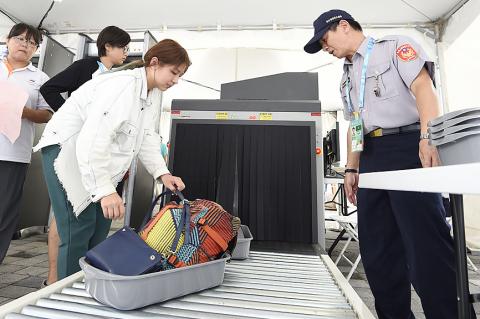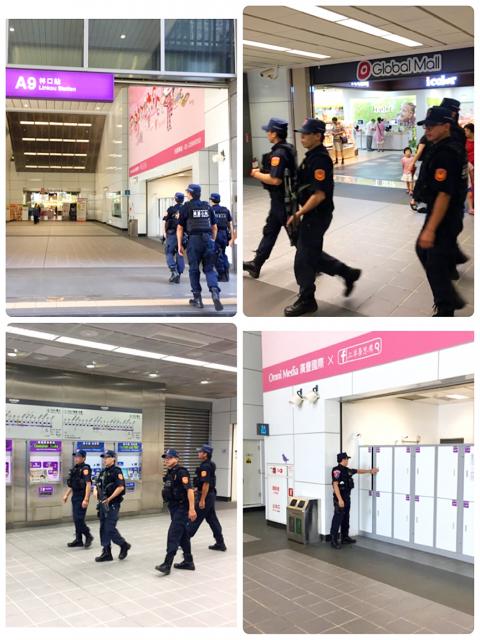The government is to link its Advanced Passenger Information System to systems in the US, Japan and Southeast Asian nations, in a move designed to help prevent terrorists entering Taiwan, with the Taipei Universiade to start on Aug. 19, officials said yesterday.
The system compares passenger lists to customs data to prevent “99.9 percent of all suspect individuals” from entering the nation, officials said, adding that such people would be prevented from boarding flights bound for Taiwan from participating nations.
Although Taiwan is not a member of Interpol and unable to obtain first-hand anti-terrorism information, it has bilateral information sharing agreements with the US and Japan, officials said.

Photo: Chen Chih-chu, Taipei Times
The US helped greatly to assemble a list of terror suspects, Taipei Mayor Ko Wen-je (柯文哲) said.
The system helped Taiwan identify a terror suspect from the United Arab Emirates as the suspect attempted to board a flight from Kaohsiung to Shanghai in 2014, officials said, adding that the suspect was repatriated to their home country.
Athletes, coaches and guests from nations participating in the Universiade are to clear customs as if they were on visa waiver programs, needing only to display their passport and invitation pass distributed by the Universiade organization team, officials said.

Photo: Wu Jen-chieh, Taipei Times
While only Taipei police and police from four other municipalities are to be “officially” on duty during the event, officials said that officers nationwide would be on stand-by.
The government expects protests during the games, as the Legislative Yuan is to hold its third extraordinary meeting by the end of the month, officials said.
On-duty officers would number 5,000, with 2,000 students from the Central Police University and 3,000 students from the Taiwan Police College called in to help.
In the event of large-scale protests or a terror attack, the nation has more than 70,000 police officers in reserve.
Separately, the Coast Guard Administration conducted a large-scale sweep aimed at preventing criminals from smuggling guns, drugs or explosives into Taiwan, Coast Guard 7th Offshore Flotilla Deputy Chief Cheng Wen-hao (鄭文豪) said.
Meanwhile, Ko yesterday afternoon announced a trial run of systems that would be used during the games’ opening and closing ceremonies.
Taipei residents should be aware that several Universiade events would require roads to be closed, Ko said, adding that the city would announce closures in advance.
The Universiade is to be the largest-ever multi-sport event hosted by Taiwan, bringing 11,397 representatives from 131 nations, including 7,639 athletes, the Sports Administration said.
Additional reporting by CNA

The US government has signed defense cooperation agreements with Japan and the Philippines to boost the deterrence capabilities of countries in the first island chain, a report by the National Security Bureau (NSB) showed. The main countries on the first island chain include the two nations and Taiwan. The bureau is to present the report at a meeting of the legislature’s Foreign Affairs and National Defense Committee tomorrow. The US military has deployed Typhon missile systems to Japan’s Yamaguchi Prefecture and Zambales province in the Philippines during their joint military exercises. It has also installed NMESIS anti-ship systems in Japan’s Okinawa

‘WIN-WIN’: The Philippines, and central and eastern European countries are important potential drone cooperation partners, Minister of Foreign Affairs Lin Chia-lung said Minister of Foreign Affairs Lin Chia-lung (林佳龍) in an interview published yesterday confirmed that there are joint ventures between Taiwan and Poland in the drone industry. Lin made the remark in an exclusive interview with the Chinese-language Liberty Times (the Taipei Times’ sister paper). The government-backed Taiwan Excellence Drone International Business Opportunities Alliance and the Polish Chamber of Unmanned Systems on Wednesday last week signed a memorandum of understanding in Poland to develop a “non-China” supply chain for drones and work together on key technologies. Asked if Taiwan prioritized Poland among central and eastern European countries in drone collaboration, Lin

BACK TO WORK? Prosecutors said they are considering filing an appeal, while the Hsinchu City Government said it has applied for Ann Kao’s reinstatement as mayor The High Court yesterday found suspended Hsinchu mayor Ann Kao (高虹安) not guilty of embezzling assistant fees, reducing her sentence to six months in prison commutable to a fine from seven years and four months. The verdict acquitted Kao of the corruption charge, but found her guilty of causing a public official to commit document forgery. The High Prosecutors’ Office said it is reviewing the ruling and considering whether to file an appeal. The Taipei District Court in July last year sentenced Kao to seven years and four months in prison, along with a four-year deprivation of civil rights, for contravening the Anti-Corruption

NO CONFIDENCE MOTION? The premier said that being toppled by the legislature for defending the Constitution would be a democratic badge of honor for him Premier Cho Jung-tai (卓榮泰) yesterday announced that the Cabinet would not countersign the amendments to the local revenue-sharing law passed by the Legislative Yuan last month. Cho said the decision not to countersign the amendments to the Act Governing the Allocation of Government Revenues and Expenditures (財政收支劃分法) was made in accordance with the Constitution. “The decision aims to safeguard our Constitution,” he said. The Constitution stipulates the president shall, in accordance with law, promulgate laws and issue mandates with the countersignature of the head of the Executive Yuan, or with the countersignatures of both the head of the Executive Yuan and ministers or